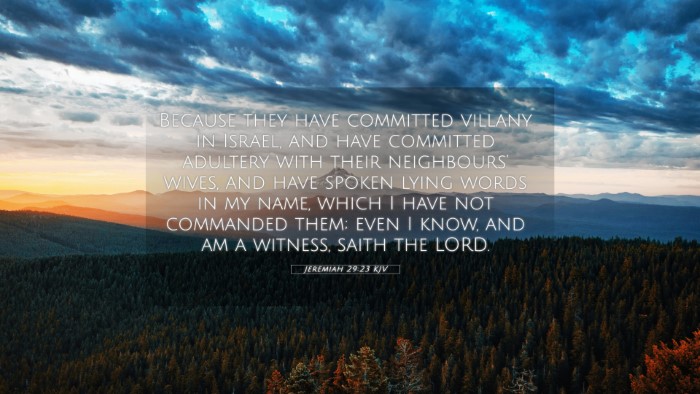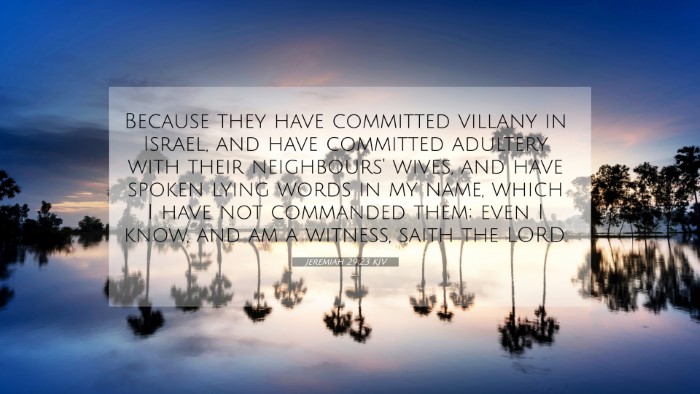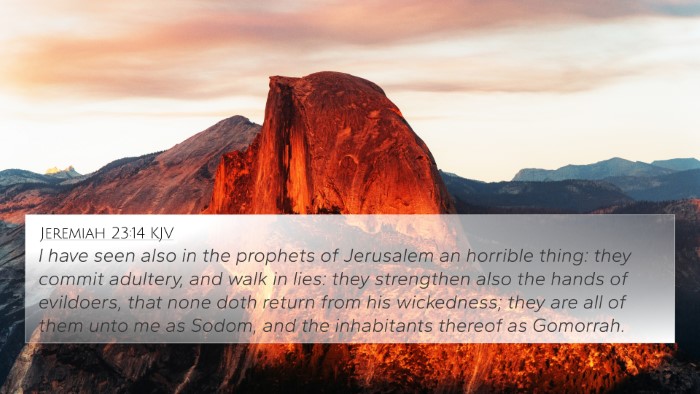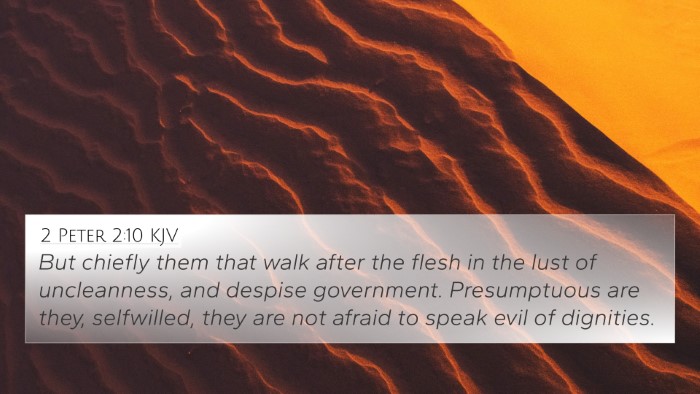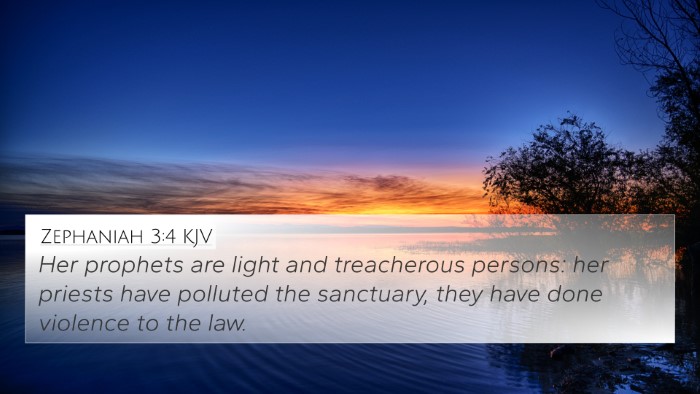Understanding Jeremiah 29:23
Jeremiah 29:23 (KJV): "Because they have done vile things in Israel, they have committed adultery with their neighbours' wives, and have spoken lying words in my name, which I have not commanded them; even I know, and am a witness, saith the LORD."
Summary of Meaning
This verse forms part of Jeremiah’s letter to the exiled Israelites, where he addresses the issues of false prophecy and moral corruption. It highlights God's awareness of their deeds and His disapproval of their actions, particularly the vile conduct and the profanation of His name.
Commentary Insights
-
Matthew Henry:
Henry emphasizes the gravity of the sins being committed. The "vile things" refer to both spiritual and physical infidelity, showing how the people have strayed from their covenant with God. He underlines that such actions are not hidden from God, as He is a witness to every transgression.
-
Albert Barnes:
Barnes points out that God's omniscience is an essential theme in this verse. The rhetorical nature of God’s witness serves as a reminder that spiritual leaders and prophets must be accountable for their actions. Barnes elaborates on how such false teachings corrupt the community and lead to divine judgment.
-
Adam Clarke:
Clarke provides insight into the consequences of this moral decay, suggesting that the people had not only sinned against one another but also against God. His commentary reflects on the seriousness of speaking falsely in God’s name, which denotes a direct challenge to divine authority.
Bible Cross-References
This verse connects to several other scripture passages that illustrate similar themes of accountability, false prophecy, and divine witness:
- Jeremiah 7:9-10: Discusses moral failures and hypocrisy.
- Ezekiel 18:30-32: Urges repentance for sin and the return to God.
- Matthew 7:15-20: Warns against false prophets and identifies them by their fruits.
- 2 Peter 2:1-3: Speaks of false teachers among the people and the destructive consequences of their actions.
- Proverbs 6:16-19: Lists things the Lord hates, including a lying tongue and sowing discord.
- Isaiah 29:13: Addresses the hypocrisy of worship and the importance of sincerity in one's relationship with God.
- Deuteronomy 18:20: Warns against false prophets and the dire consequences of misrepresenting God.
- Romans 1:18: Discusses God's wrath against unrighteousness and how no one can escape His judgment.
- Hebrews 4:13: Reiterates that nothing is hidden from God's sight, emphasizing His omnipotence and omniscience.
- Galatians 1:8-9: Paul emphasizes the severity of preaching any gospel other than the one received from God.
Connections between Bible Verses
Understanding Jeremiah 29:23 benefits from linking it to other scriptures. This practice provides a rich context for realizing the shared themes of accountability, the dangers of falsehood, and the serious implications of turning away from God's commands.
For instance, the connection between Jeremiah’s warning of vile actions and Ezekiel’s call to repentance illustrates the consequences of sin and the pathway back to righteousness. This is significant not only for the Israelites in exile but for believers today, emphasizing the need for integrity and truth in our relationship with God.
Thematic Bible Verse Connections
By cross-referencing these scriptures, we can see a thematic resonance that underscores God's expectations from His people:
- Moral Integrity: Both Jeremiah and Ezekiel present a call to moral integrity in the face of widespread corruption.
- Divine Justice: The concept of God's judgment against false prophets is echoed throughout the New Testament as well.
- Repentance: There is a consistent theme of needing to turn back to God and away from sinful behaviors.
Conclusion
The understanding of Jeremiah 29:23 invites a deeper reflection on the nature of our relationship with God and the serious implications of our actions. Cross-referencing this verse with scriptural texts across both the Old and New Testaments enriches our comprehension of its themes and teachings.
In studies of scripture, it is vital to use tools for Bible cross-referencing effectively. These tools can significantly assist in identifying connections between Biblical texts and drawing meaningful insights that resonate with both contemporary life and historical contexts.
How to Use Bible Cross-References
Engaging in a cross-reference Bible study involves:
- Identifying key themes in the verses being studied.
- Utilizing a Bible concordance to find related verses.
- Following links between Old Testament prophecies and New Testament fulfillments.
- Examining how different scriptures support one another’s messages.
By following these methods, one can gain a comprehensive understanding of scriptural truths and their applications in today's context.
Encouragement for Further Study
For those who desire to delve deeper into the understanding of scripture, exploring the inter-Biblical dialogue found through thematic cross-referencing can yield profound insights. This approach not only enriches one’s knowledge but also enhances the practice of applying Biblical principles in everyday life.

